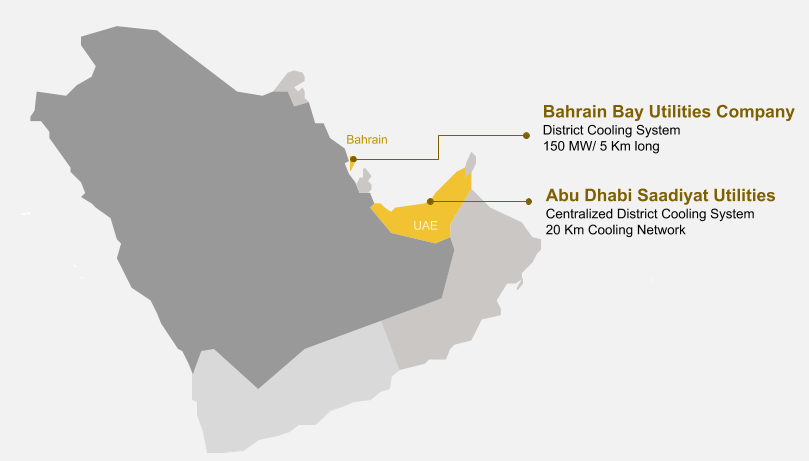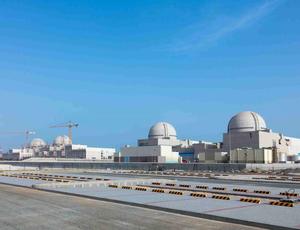LOCAL LOOP OF ENERGY
Veolia Middle East works as an expert to design, build, operate and maintain district cooling networks, as well as renewable energies plants from biogas, waste recovery or solar energy.
With our cooling solutions, we provide centrally-produced chilled water, providing residents, commercial buildings an efficient, competitive, reliable source of energy. With local loops of energy, we support new development and provide comfort to existing projects.
As a decentralized energy specialist, Veolia provides energy solutions that offer high-added value and meet requirements in terms of reliability, quality, availability and cost.
A District Cooling System ("DCS") produces chilled water within a centralized energy plant and distributes it through underground pipes to buildings connected to the system and provides them with air-conditioning. Therefore, individual buildings do not need split systems, chillers and/or cooling towers. Once used in customer buildings, the water is returned to the central plant to be chilled again and then re-circulated through the closed-loop piping system.
Why Veolia Energy Solutions?
We understand that master developers and cities are strongly committed to end-user satisfaction and the protection of the environment as well; more than ever, they also need to control their costs and reduce their risk, while guaranteeing reliability and creating a safe environment.
Our Understanding of the Challenges in the Industry
- Optimizing consumption of process chilling, comfort cooling, steam, controlled atmosphere, electricity, compressed air/vacuum and other utilities
- Guaranteeing reliable utilities supply while upholding the highest quality standards
- Reducing the energy bill and operating costs
- Improving the operations management by promoting innovative solutions
- Preventing health and safety risks
- Reducing the ecological footprint of sites
- Making social responsibility a cornerstone of competitiveness
Veolia Middle East references:

In today’s world, both businesses and local governments alike need to meet increasing energy demands while achieving sustainability commitments. At the same time, waste generation levels are accelerating, leaving communities and industry looking for ways to sustainably recycle or recover resources.
When sewage sludge becomes a source of green energy
The treatment of residual sludge from sewage treatment plants is a challenge that municipalities now have to tackle. They can achieve this by recovering the sludge to produce biogas by a process of thermal hydrolysis and anaerobic digestion.
From wastewater to green energy: biogas generation
Transforming sludge into biogas (which is a source of green energy) gives value to materials previously deemed harmful. It also helps combat the scarcity of raw materials and the use of fossil fuels.
For sewage treatment plant operators, converting sewage sludge into biogas complies with environmental regulations, drastically reduces residual sludge volumes and creates a new revenue stream, either by using the energy produced on-site, or by selling it to the local grid.
Contributing to sustainable cities building
A sustainable city is one designed with consideration of environmental impact. It is designed to minimise inputs such as energy, water and food, and outputs, such as heat, air pollution and water pollution. Sustainable development is an essential part of our business. We believe we can make a substantial contribution to the environmental, social and economic challenges of our time, while protecting, supporting and enhancing the human and natural resources needed in the future.
UAE - Dubai Municipality
Veolia Middle East to Produce Green Energy from sewage sludge for Dubai Municipality. A pioneering project for the Emirate’s Government that will generate electricity from Al Aweer wastewater treatment plant by-products.
- More than 58,000 m3/day of biogas generate from sludge treated
- Production of 45,000 MWh of electricity per year through the conversion of biogas recovered from the digestion of wastewater sludge
- Help reduce Al Aweer sewage treatment plant’s CO2 emissions by more than 31,000 tonnes per year



